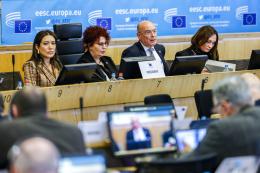European Economic
and Social Committee
Civil society demands an EU Blue Deal to alleviate the social costs of water scarcity in Europe
On 13 April 2023, the European Economic and Social Committee (EESC) held a public hearing to address the pressing issue of water poverty and its implications on social policy. The event brought together water experts and stakeholders to mitigate the effects of water poverty, particularly on vulnerable communities. The hearing is part of the EESC's efforts to put water at the top of the EU agenda through a call for an "EU Blue Deal."
Water poverty is a complex issue that arises from a range of drivers, including climate change, water pollution, demographic changes, and the increasing gap between financing needs and capacities in Europe. The EESC public hearing on water poverty emphasised the need for collective action at all levels to ensure access to affordable water as an ethical imperative and as crucial for the realisation of the right to water.
Pietro Francesco De Lotto, President of the EESC's Consultative Commission for Industrial Change and President of the study group, said that Water is a strategic common public good that is also scarce now. As the voice of civil society, we need to find practical, technical proposals to be presented to the new incoming European Commission and Parliament.
A panel of institutional stakeholders discussed the pressing issue of water scarcity and management in Europe. Rui Manuel Vitor Cortes, from the University of Tras-os-Montes and Alto Douro, used the example of Portugal and Spain to illustrate the impact of drought on agricultural activities, soil degradation and resulting food security and tensions. The EU Water Framework Directive (WFD) was also discussed as a means to introduce economic rationality in water management, but there are concerns about the impact on vulnerable populations, particularly in rural areas.
Social partners, civil society organisations, and academia emphasised the importance of access to good quality water and affordability. Keynote speaker Gabriella Sódar, Head of Business Development at the Blue Planet Foundation, stressed Principle 20 of the European Pillar of Social Rights, which asserts that all citizens have the right to access essential services of good quality, including water and sanitation.
Despite this, up to 10 million EU citizens still struggle with inadequate access to clean and affordable water. Pollution, ageing infrastructure and scarcity of resources can lead to severe health and social consequences, including waterborne diseases, malnutrition, dehydration, impaired cognitive function, mental health problems and maternal and child health problems. The hearing called for more efficiency, better enforcement of existing rules, new instruments for environmental responsibility and financing mechanisms beyond tariffs to address these issues.
Kinga Joó, rapporteur of the EESC opinion, highlighted the added value of an EU approach to this subject, for which it is difficult to find relevant and up-to-date data. Joó said: The EU must step up efforts on research. We need more and better data to create an accurate overview of the issue to be able to solve it.
Carlos Manuel Trindade, co-rapporteur of the EESC opinion, added that water is fundamental to all aspects of life,
and that the Committee has a duty to put forward suggestions and solutions to the water crisis.
The opinion will be voted on at the EESC's July Plenary session, and its recommendations will be included in the EESC umbrella opinion on the EU Blue Deal in autumn 2023.
Work organisation
Downloads
-
Civil society demands an EU Blue Deal to alleviate the social costs of water scarcity in Europe

